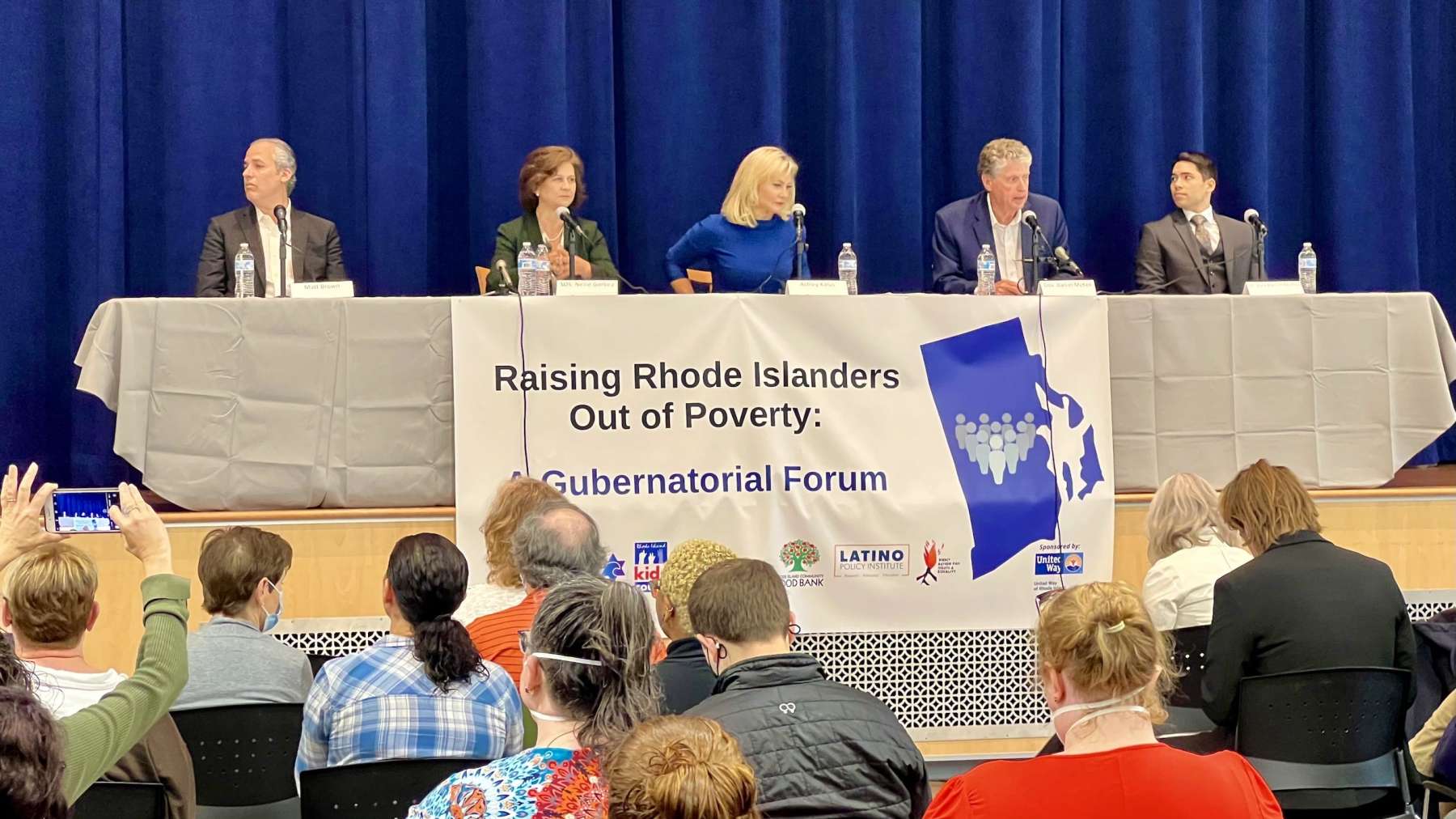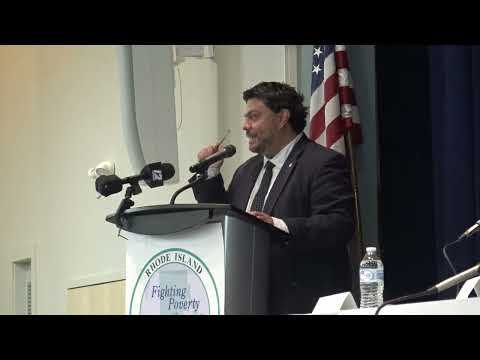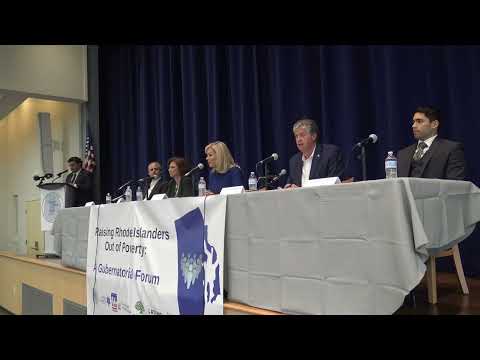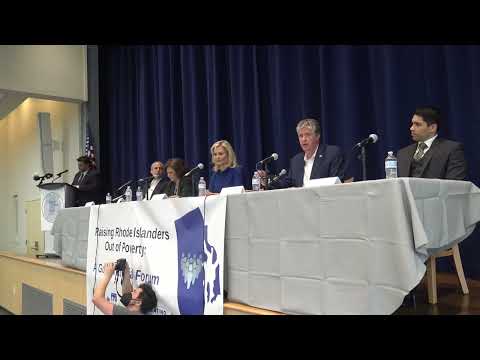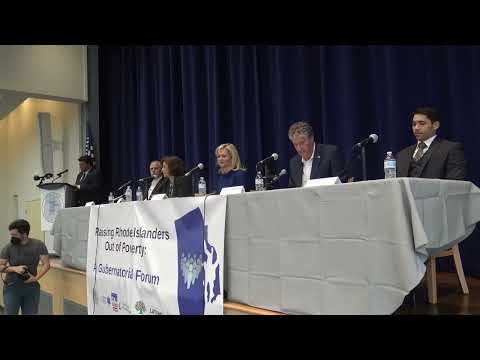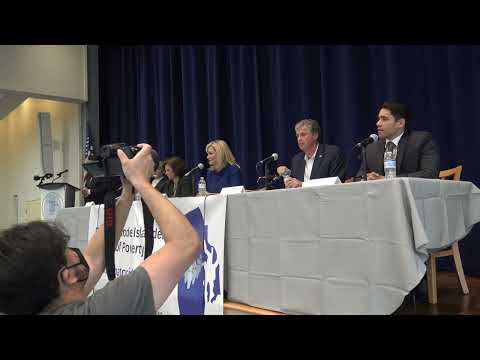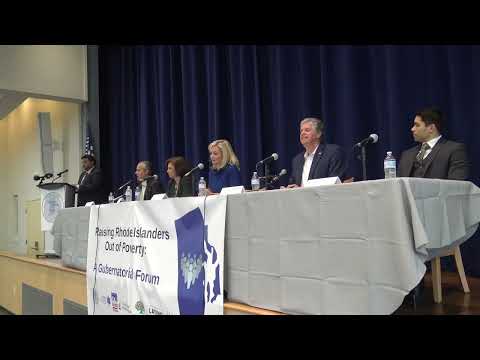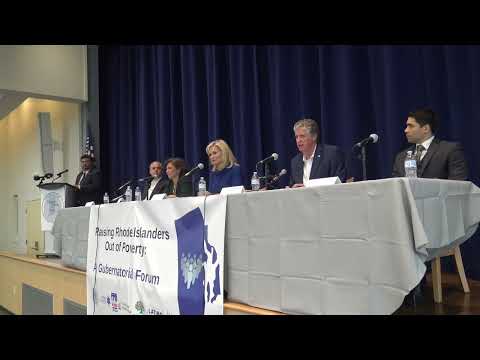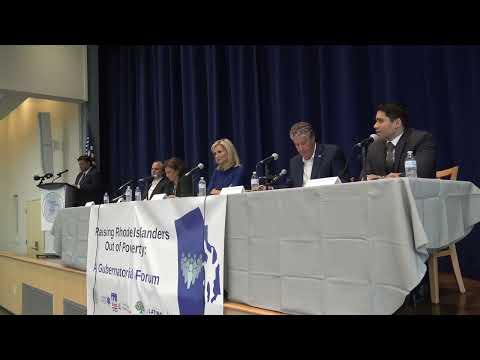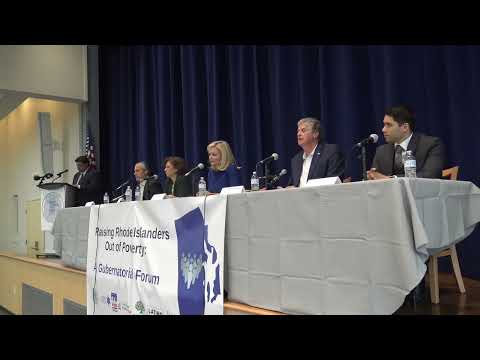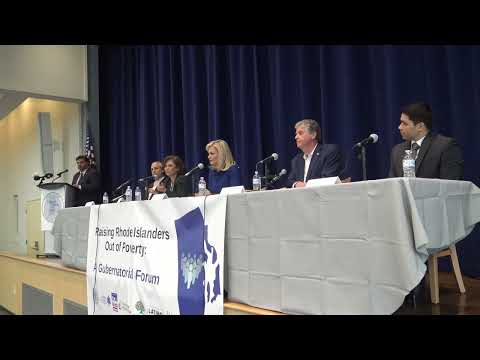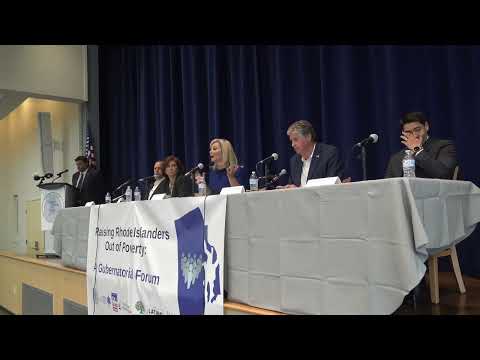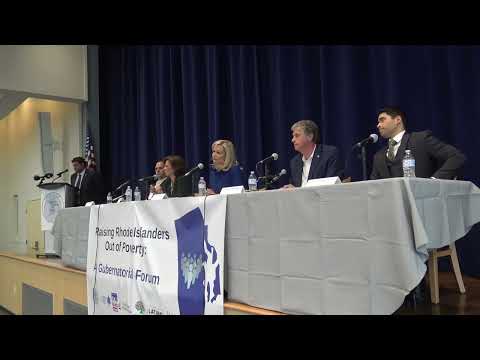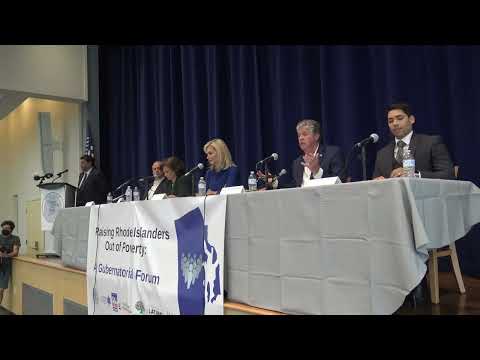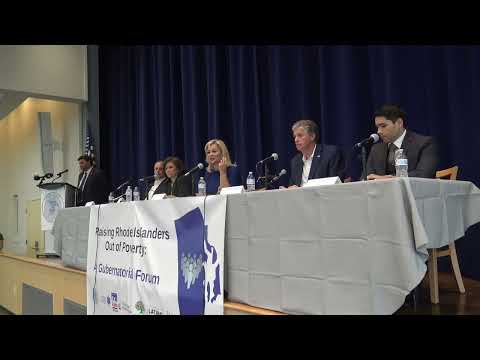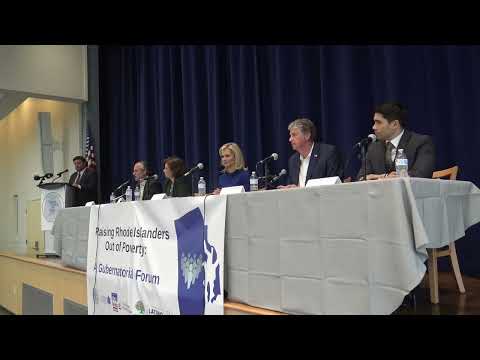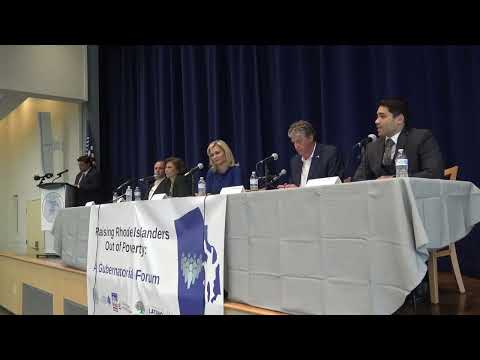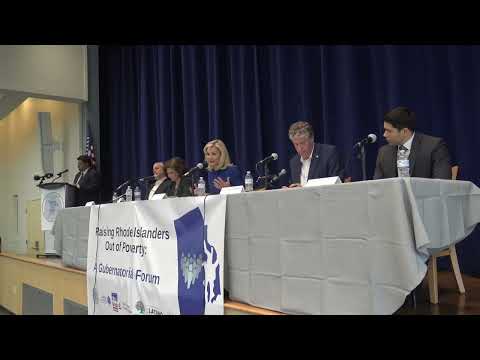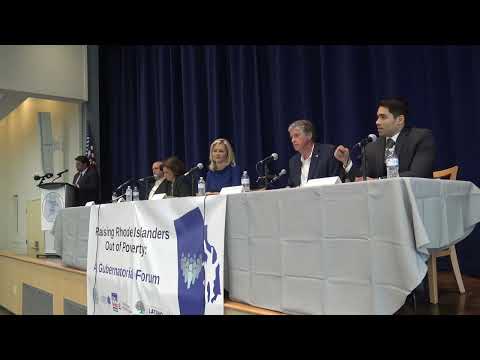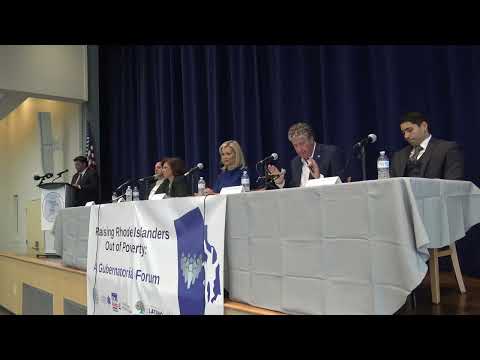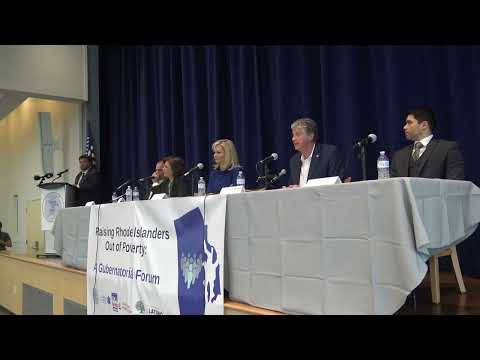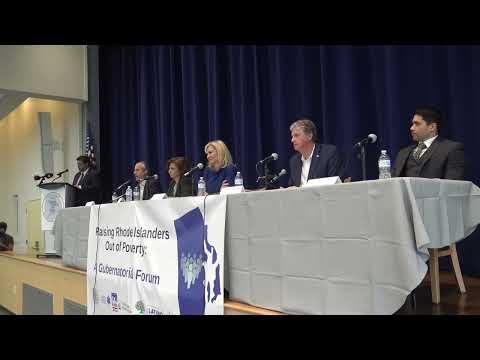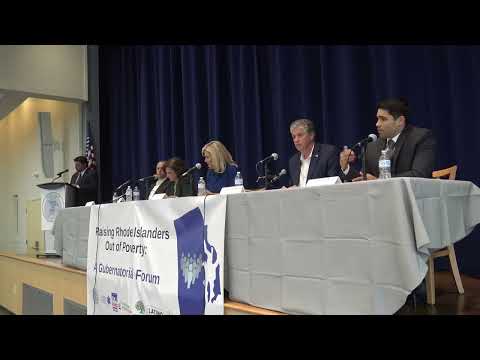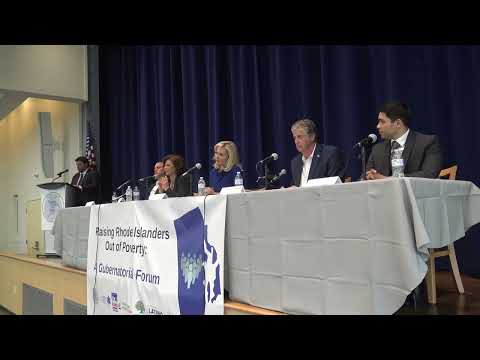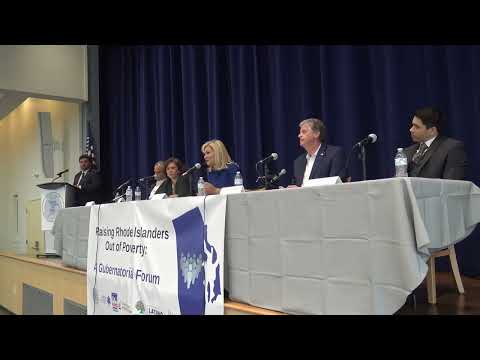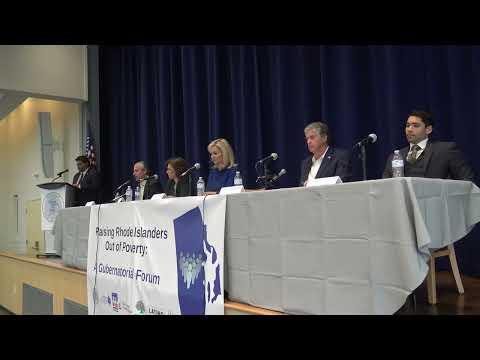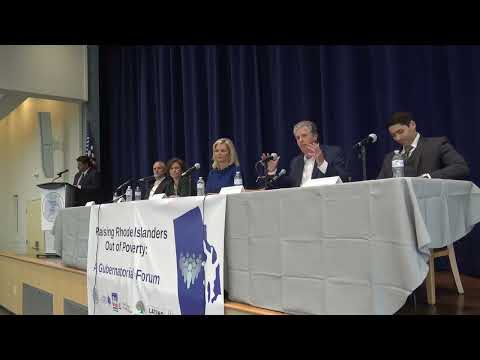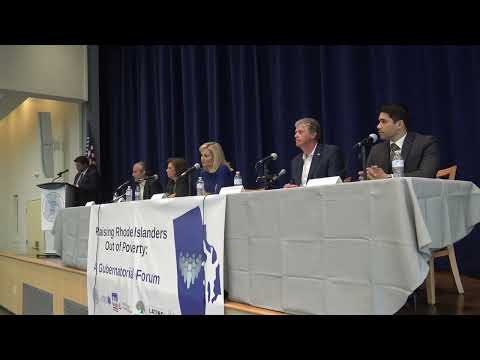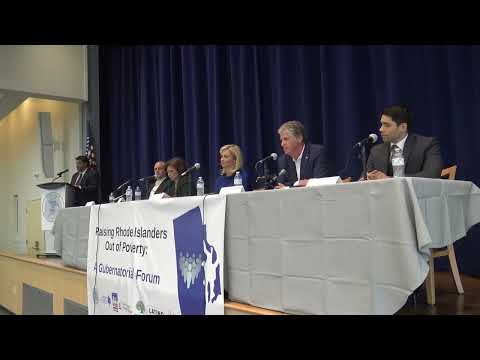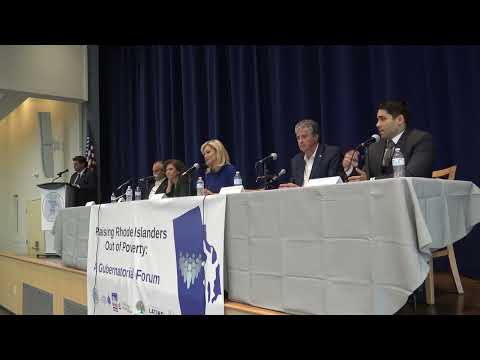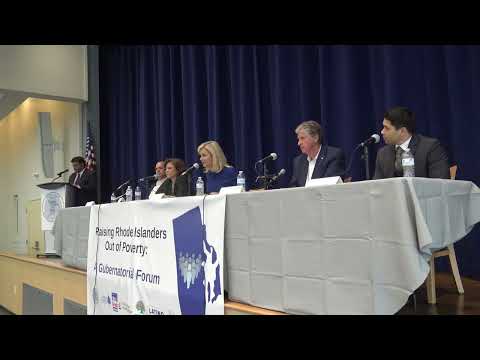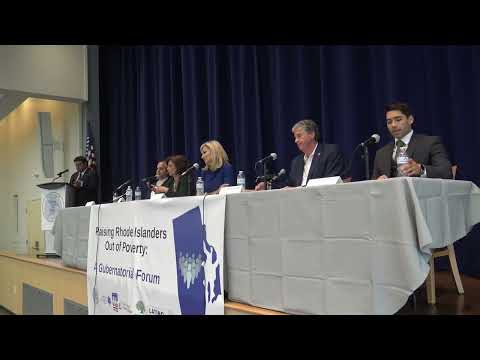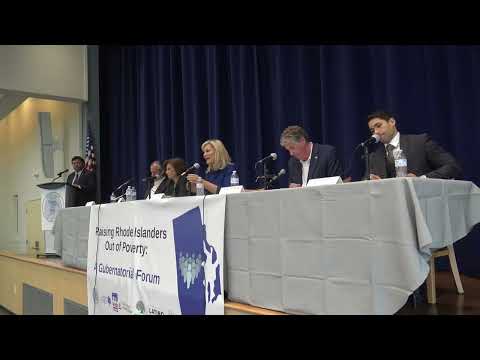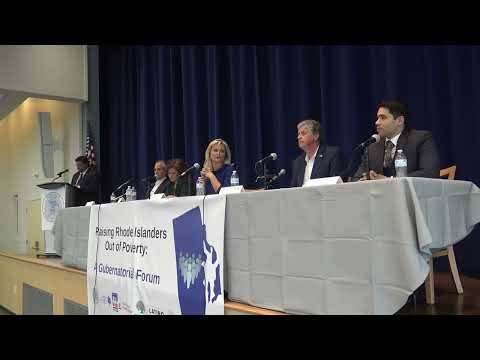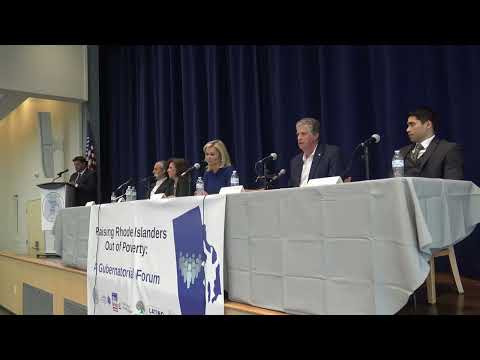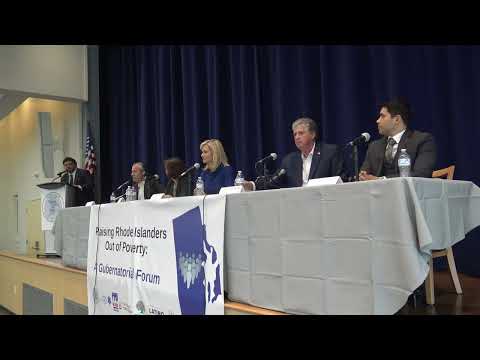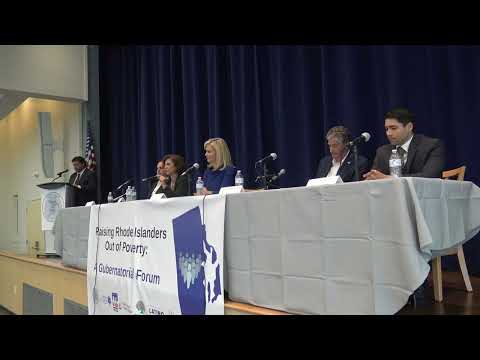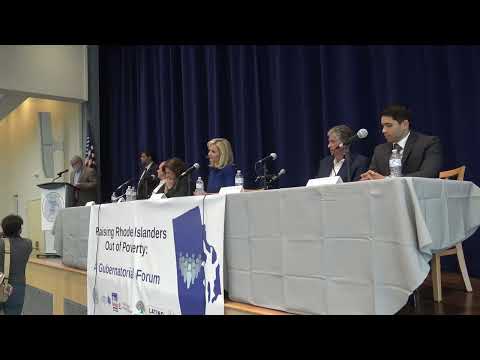At forum, candidates for governor discuss raising Rhode Islanders out of poverty
“Throughout our diverse faith traditions, we believe that we have a moral obligation to address systemic poverty and inequality in our society,” said David Veliz, Director/Organizer of the Coalition, who served as emcee.
May 28, 2022, 6:18 am
By Steve Ahlquist
Five of the six most prominent candidates for Governor of Rhode Island took the stage at The Jewish Alliance of Rhode Island on Friday morning as part of a gubernatorial forum about “Raising Rhode Islanders out of Poverty.” In attendance were Democrats including incumbent Governor Daniel McKee, Secretary of State Nellie Gorbea, [former] Secretary of State Matt Brown, Dr. Luis Daniel Muñoz and Republican candidate Ashley Kalus. Candidate Helena Foulkes, a Democrat, could not attend due to illness.
Candidates were questioned about housing, healthcare, food insecurity, education and more and discussed how they might deal with the issues of rising poverty, inequality and homelessness were they to become Governor of Rhode Island. The questions were posed by representatives and field experts from Rhode Island nonprofits.
The event was put on by the Rhode Island Interfaith Coalition to Reduce Poverty (Coalition), in partnership with the Economic Progress Institute, Rhode Island Kids Count and the Latino Policy Institute, and with the support of United Way of Rhode Island, Direct Action Action for Rights and Equality (DARE), the Rhode Island Food Bank and The Jewish Alliance of Greater Rhode Island. David Veliz, Director/Organizer of the Coalition, served as emcee.
The forum was intended not only as a means of determining candidate positions on a wide variety of issues pertaining to poverty in Rhode Island but also to raise awareness among voters and candidates about the Coalition’s vision that all Rhode Islanders deserve a safe and affordable home, adequate and nutritious food, quality and equal education, affordable and accessible healthcare and work with decent wages.
“Throughout our diverse faith traditions, we believe that we have a moral obligation to address systemic poverty and inequality in our society,” said David Veliz, Director/Organizer of the Coalition, who served as emcee. The event began with a prayer from Coalition committee member Reverend Chontell Washington and words of introduction from Adam Greenman, Executive Director of the Jewish Alliance.
The videos below are divided by question and candidate. Each question is written out as asked, and the responses of the candidates are provide on the videos.
Q1. Kristina Brown, Program Officer, Housing and Economic Policy, United Way of Rhode Island
The pandemic has laid bare the importance of having a safe, healthy, affordable home. Over the last two years we have seen the housing crisis worsen in Rhode Island. With the real estate market breaking records for home sale prices, rents are soaring out of reach for most households and a five times increase in our residents experiencing homelessness. According to the latest GAP Report from the National Low Income Housing Coalition, Rhode Island has a deficit of 24,000 homes that are affordable and available tot he lowest income households. Over 70% of households earning 50% of area median income are housing cost burdened. That means they are spending too much of their income on housing costs and they cannot afford other basic needs such as food, transportation or healthcare. Right now we have the opportunity to invest in affordable housing development and yet it is clear that there are still barriers at the local level that make building any new units in many municipalities extremely difficult. According to Rhode Island Housing only six municipalities meet the ten percent goal of low and moderate income units in their communities. We will not be able to meet the needs of low and moderate income Rhode Islanders if municipalities are not willing to proactively identify how they will meet the ten percent goal of long term affordable units.
So our question is: As Governor, how do you intend to ensure that the state and federal dollars allocated to the development of affordable housing will produce units throughout the entire state? What incentives or requirements will you implement so that more municipalities make progress towards achieving the ten percent goal?
Ashley Kalus:
Daniel McKee:
Nellie Gorbea:
Dr. Luis Daniel Muñoz:
Matt Brown:
Q2. Andrew Schiff, CEO of the Rhode Island Food Bank
After the outbreak of COVID-19 over the last two years, we’ve seen a significant increase in food insecurity and hunger, particularly among families with children. In 2021 Brown University’s School of Public Health conducted a study and they showed that 18% of Rhode Island households can’t afford adequate food. The rate was even higher for families with children, 25%. Fortunately, the federal government took steps to reduce child hunger. The USDA [United States Department of Agriculture] was able to make school breakfast and school lunch free for all students. That provision is ending with the end of the school year and so some states, like Maine, have decided to continue to provide school meals to all children at no charge.
My question to you is: Would you commit to using state funds to provide free school meals for all children in Rhode Island? Yes or No?
Daniel McKee:
Dr. Luis Daniel Muñoz:
Matt Brown:
Nellie Gorbea:
Ashley Kalus:
Q3. Marcela Betancur, Executive Director, Latino Policy Institute
Poverty is intrinsically and historically linked with systemic racism within our society. In Rhode Island, communities of color, including Indigenous, Black, South East Asian and immigrant communities disproportionately experience inequity and struggle harder to meet their basic needs. Poverty rates in our communities of color are more than three times that of our white communities. Just 30-34% of communities of color are homeowners in the State of Rhode Island, compared to 68% in white communities. Over 34% of communities of color face food insecurity, compared to 14% of white households.
My question today is: What specific policies would you propose to address longstanding, unacceptable racial and ethnic disparities in our state?
Nellie Gorbea:
Daniel McKee:
Ashley Kalus:
Matt Brown:
Dr. Luis Daniel Muñoz:
Q4. Linda Katz, Policy Director, Economic Progress Institute
My question is about economic security. When we talk about economic wellbeing, we start from the premise that families need to be able to meet their most basic needs, including safe housing, adequate food, healthcare, transportation, and childcare. The Department of Human Services [DHS] is responsible for processing eligibility for SNAP, Rhode Island Works, GPA [General Public Assistance] and the Childcare Assistance Program – many of the programs that are vital to Rhode Islanders to meet their basic needs. And while accessing these benefits that help people survive is important, it is not the end goal. As governor, you would also be responsible to create opportunities for upward mobility, especially for communities of color, who are disproportionately lower income due to historic racial oppression and exclusion and present day discrimination. So two questions:
- What would you do to ensure that DHS provides residents with efficient and timely access to basic needs benefits, addressing plans for sufficient in-person application assistance as well as online applications?
- What is one program you would champion to boost upward mobility for Rhode Islanders, especially communities of color?
Ashley Kalus:
Dr. Luis Daniel Muñoz:
Daniel McKee:
Nellie Gorbea:
Matt Brown:
Q5. Paige Clausius-Parks, Senior Policy Analysts, Rhode Island Kids Count
Education is the cornerstone of economic and racial equality. All children, including children living in poverty, children in high needs school districts, children of color, and multi-lingual learners need equitable access to a high quality education, including childcare, pre-K and Head Start, and excellent K-12 public schools. This is a three part question:
- What changes do you think are needed for early childhood through our pre-K system so all children receive the high quality education they need to succeed?
- Yes or No? Would you support a change to the state’s education funding formula to provide more support to multilingual learners?
- Yes or No? Would you support a Rhode Island Constitutional amendment to establish that an equal, adequate and meaningful education is a fundamental right, as Massachusetts has?
Dr. Luis Daniel Muñoz:
Nellie Gorbea:
Ashley Kalus:
Matt Brown:
Daniel McKee:
Q6. As many of you know, Rhode Island has some of the highest utility rates in the country which leads to unnecessary shutoffs and are impacted poor communities throughout the state. To advocates, it’s not only a social justice issue, it’s an environmental justice issue because not only should we care about where our energy comes from, we should care about how that energy is being used and who it is impacting.
Many non-profit organizations, including the George Wiley Center and the Rhode Island Poor People’ Campaign, have been working to pass a Percentage of Income Payment Plan. Legislation has been introduced for several years that would allow Rhode Islanders in a lower income bracket to pay less for utilities, at a percentage of their income. As Governor, would you support the passage of the Percentage of Income Payment Plan [PIPP]?
Matt Brown:
Daniel McKee:
Dr. Luis Daniel Muñoz:
Ashley Kalus:
Nellie Gorbea:
At the end of the forum each candidate was given two minutes to provide a closing statement:
Ashley Kalus:
Dr. Luis Daniel Muñoz:
Daniel McKee:
Matt Brown:
Nellie Gorbea:
The closing prayer was from Rabbi Jeffrey Goldwasser of Temple Sinai:



